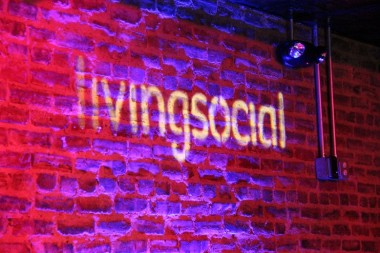LivingSocial Says It Has No Plans to Be a Mobile Payments Provider
LivingSocial has no plans to build a payment system for local merchants, but it does see itself playing a role in building loyalty programs and other merchant services.

During an all-day media event today, the company’s top executives provided a very broad overview of the privately held company.
It also gave us a tour of its six-story building in Washington, D.C., that it uses for hosting events, including art classes, pop-up restaurants and exercise classes. Later, it gave us an option of checking out a mixology class or trapeze lessons. (Personally, I opted to learn how to make refreshing beverages on this blistering 95-degree day!)
Dickson Chu, LivingSocial’s SVP of merchant services, said this summer it will test out at least three concepts with merchants in the payments and loyalty space. He declined to provide specifics, but LivingSocial’s CEO Tim O’Shaughnessy verified that it was not interested in competing directly with payment processors.
That’s sort of a novel comment given that so many companies have recently entered the space to compete against Visa, MasterCard and American Express, like PayPal or Square.
“We have a big business here, and we probably aren’t going to be a real active Square competitor,” the company’s chief said.
Over the past several months, critics have wondered if the daily deals business is sustainable and if it will be able to continue to attract consumers at the same rate. After all, the novelty of getting meals, spa treatments and other services at 50 percent off starts to wear thin. As a result, providers in the space have begun to cast a wider net by branching into other areas of local commerce.
 In particular, Groupon, the industry leader, has been vocal about providing technology solutions to local merchants, including online scheduling software and rewards programs that track consumer spending. More recently, reports have surfaced that Groupon is testing out a mobile payments product, including an aggressively priced service that is much cheaper than the big payments processors like Visa and MasterCard, and even than the emerging players like Square and PayPal.
In particular, Groupon, the industry leader, has been vocal about providing technology solutions to local merchants, including online scheduling software and rewards programs that track consumer spending. More recently, reports have surfaced that Groupon is testing out a mobile payments product, including an aggressively priced service that is much cheaper than the big payments processors like Visa and MasterCard, and even than the emerging players like Square and PayPal.
Over lunch at Kushi, a Washington, D.C., sushi restaurant that has run three LivingSocial deals, owner/chef Darren Norris said he spent $17,000 on his restaurant’s point of sales system, and it’s “the worst built machine in the restaurant.” In response, Chu said LivingSocial isn’t particularly interested in making hardware, but “we will solve that problem.”
Since joining the company in December from Citibank (and before that, PayPal), Chu has been investigating other services they could offer to merchants. One idea is to come up with a way for LivingSocial to automate a restaurant’s Facebook page or other social channels, which small business owners don’t typically have the time to keep up to date.
During the company’s update on the state of the business, the executives declined to comment on the private company’s financials. O’Shaughnessy also said it had no immediate plans to file to go public. Amazon continues to own roughly a third of the company, and reported as part of its financial results that the company had an operating loss of $92 million on revenues of $110 million in the first quarter.
Here are some of the figures that LivingSocial did provide:
- has 67 million subscribers
- operates in 600 markets in 20 countries
- has worked with 115,000 merchants
- employs 5,000 employees
- has raised $600 million in capital
- says 20 percent of purchases occur on mobile devices, and that its apps are being downloaded 100,000 times a week for a total of 11.5 million times
- says 25 percent of revenue now comes from non-core daily deals, such as travel, family, adventures, Amazon.com — many of which are full-priced.








